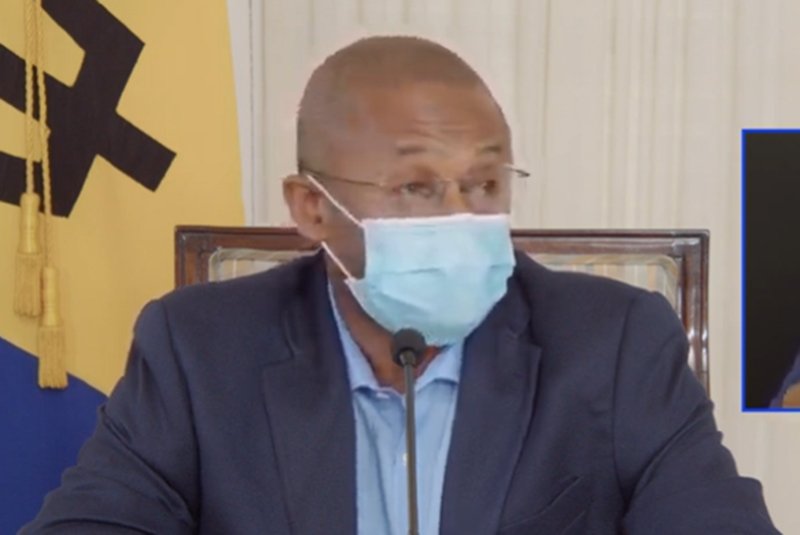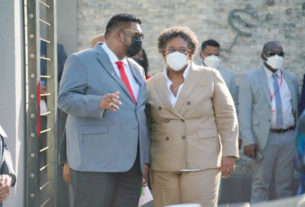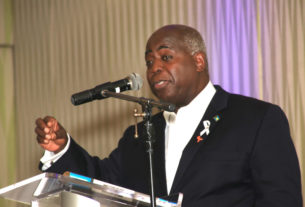COVID-19 Update and Press Conference (Jan. 29, 2022) featuring Health Minister the Honourable Ian Gooding-Edghill, Chief Medical Officer Dr. Kenneth George, Head of Home Isolation Dr. Adanna Grandison, And Director of Medical Services at the Queen Elizabeth Hospital, Dr. Clyde Cave.
As Barbados continues to battle the COVID-19 pandemic, Chief Medical Officer, Dr. The Most Honourable Kenneth George, provided an update on the current situation, including its R-effective rate, new quarantine period and numbers in isolation facilities.
Speaking during a COVID-19 update at Ilaro Court this afternoon, Dr. George shared that the country continues to record increasing rates of newly confirmed COVID-19 cases, and the country was in weeks four to five of Omicron surge cases, as predicted by the University of the West Indies.
He explained that the Ministry of Health and Wellness assesses the country’s COVID-19’s risk using three metrics – the R-effective, the case counts and the positivity rates.
“The R-effective rate today is 1.2., and that suggests that there is spread within our communities. We [would] like that rate to be one or less, and in addition, although there has been some fluctuation in our positivity rate, it continues to trend upward, with the highest being recorded at 26 per cent…. They were 630 new positive cases, and 12 persons will be released from isolation today,” Dr. George reported.
He also stated that the Ministry had received from the Caribbean Public Health Agency (CARPHA) 17 out of 20 samples sent, and those 17 samples were positive for Omicron. He added that the Best-Dos Santos Public Health Laboratory has had close to “100 per cent concordance” with the samples collected by CARPHA.
With respect to the number of persons in isolation facilities, the Chief Medical Officer shared that there were just over 150 individuals in isolation facilities, and within the Harrison’s Point Isolation Facility, there were 111 individuals, who were in Primary A and Primary B. However, he noted that over 70 per cent of those individuals were in secondary isolation.
“The persons requiring oxygen-assisted ventilation and ventilation is 18, and we only have two individuals who are on intubated and on complete ventilation at this time. The occupancy of Harrison’s Point is between 35 and 40 per cent,” Dr. George said.
He also spoke about the change to the length of time persons spent in quarantine. “Effective immediately, the quarantine period for persons is no longer five days. Quarantine is for three days and you retest on the fourth day. This was instituted based on the epidemiology and the science of transmission of Omicron,” he stated.
Dr. George also disclosed that there were outbreaks at the Geriatric and Psychiatric Hospitals, two nursing homes and one children’s home. This spread of infection, he said, “is testimony to the level of infection within our communities”. The country’s Chief Medical Officer expressed the hope that the COVID-19 case numbers would start to trend downwards, and that every Barbadian household “will play its part in managing the disease at this point and time”.
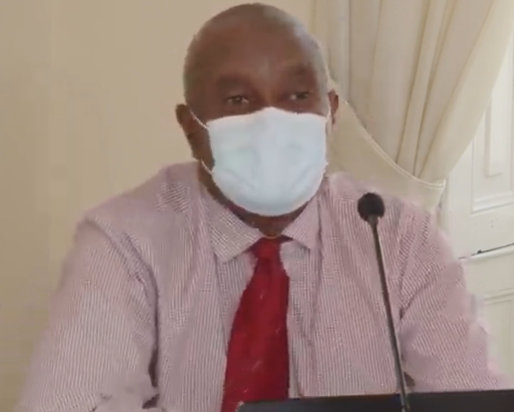
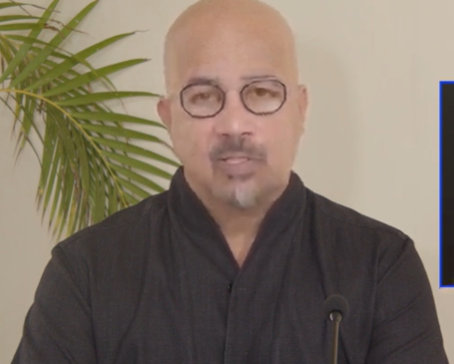
sheena.forde-craigg@barbados.gov.bb
XXXXXXXXXXXXXXXXXXXXXXXXXXXXXXXXXXXXXXXXXXXXXXXXXXXXXX
Families Encouraged To Care For COVID Positive Relatives
Barbadian families have been urged to take care of their positive COVID-19 relatives who meet the criteria to isolate within the home, and not ask them to leave the household.
Consultant Manager of Home Isolation, Dr. Adana Grandison, today gave the assurance that COVID-19 positive patients could safely home isolate with negative family members without spreading the virus, if the necessary precautions are put in place.
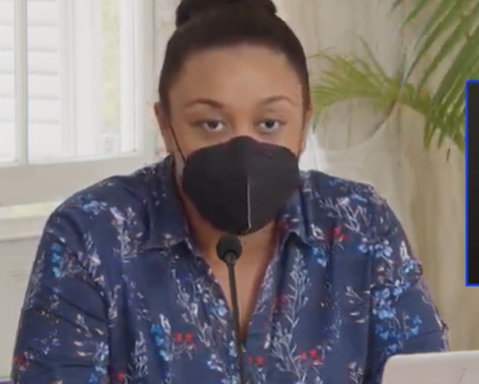
Speaking during a virtual press conference to provide a COVID-19 update, Dr. Grandison noted that there was a “significant amount of panic” about how negative persons should handle themselves in a household where a family member tested positive for the virus.
“We have had a few unfortunate situations where persons would have become COVID positive and would have been asked to leave the home by their family members; placed on the outside,” she said.
However, the doctor stressed that COVID was not a death sentence, and outlined a series of measures to be taken in the event that a family member has tested positive and asked to home isolate.
Some of these measure include: the use of a properly fitted face mask; the frequent sanitisation of a shared bathroom and regularly touched surfaces, such as handles, sink knobs and the toilet bowl handle to flush, with antibacterial wipes like Lysol or Clorox wipes or Clorox mixed with water.
She added that in cases where a COVID-19 positive person needed to share a bed with a family member who was negative, then they should do so in a head-to-toe situation, and facing away from each other.
Positive breastfeeding mothers were also encouraged to continue breastfeeding their infants, but to ensure that they wear a mask while doing so.
Dr. Grandison further encouraged persons isolating at home to “allow themselves to be pampered” and have their meals prepared and brought to them, while staying in their room, where possible.
These meals, the doctor pointed out, should be brought preferably in disposable containers, but should regular household wares be used, they should be washed with warm water and soap, and allowed to dry.
Dr. Grandison also acknowledged the importance of mental health, and noted that in the event that the COVID-19 positive person needed to leave the room for any reason, then they should wear a mask in the presence of other family members.
She also urged persons who notice relatives developing symptoms such as shortness of breath, extreme weakness or tiredness, and loss of consciousness or fainting to seek assistance urgently.
Dr. Grandison said that with the prevailing Omicron variant, doctors were seeing an increase in cases of persons with vomiting and diarrhoea. In such cases, she advised persons to “take it nice and slow”, and to use small volumes of fluid to remain hydrated.
Noting that the Omicron wave appears to be mild for the majority of persons, given the predominance of non-communicable diseases, Dr. Grandison advised persons to pay close attention to monitoring their blood pressure and blood sugar, and eating healthy foods. There are currently 9,575 persons in the home isolation programme, with 3,426 of them being categorised as ‘green’, meaning they are not showing any symptoms. To date, there have been 17,287 persons discharged, and eight deaths recorded, under the programme.
julia.rawlins-bentham@barbados.gov.bb

